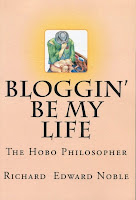Christianity
by Richard E. Noble
I was born a Christian, raised a Christian, and have lived all of my life in highly Christian areas, and in, for the most part, what the world would consider a Christian Nation. But still I have trouble in defining what a Christian actually is.
Most reference books will inform you that a Christian is a person who follows the teachings of Jesus. But I can not consider this a true definition. People claiming to be Christians range all the way from pacifist (Quakers), to barbarian (Nazis), and every stage of development and opinion in-between. What Jesus may or may not have preached is almost indiscernible when viewed from the perspective of the various teaching of all of the various sects claiming to be Christians. So disregarding the various interpretations of the teachings of Jesus, what unifying quality would all of the various Christians agree to?
I think all Christians would agree that Jesus was God - or is of a Divine Nature. I don’t know for sure, and there may be Christian sects who follow the teachings of Jesus but who do not believe in the divinity of Jesus, but if there are, I am unaware of them. If I am not mistaken Albert Schweitzer was such an individual. He wrote a very interesting book, entitled: “In Search of the Historical Jesus”. Albert’s conclusion was that the historical record was much too obfuscated to find any accurate evaluations. He further concluded that Jesus was not God and had made no claims to being God that could be corroborated, historically. Yet Albert went on to live his life in accordance with what he believed to be the philosophy of “love” as proposed by the “prophet” Jesus. But I think most would agree in today’s language a Christian would be a person who devotes himself to the notion that Jesus Christ was Divine, the Son of God, and a God, himself
So then I wonder, is this the belief or opinion of the majority of the World?
It is not. The majority of the world does not believe that Jesus was God or that he was of a Divine Nature.
That is shocking, isn’t it? In fact, did you know that the early Christian Church argued and debated over this very notion for quite some time. It was still being debated in the fourth, fifth and sixth centuries. There was Nestorius and Saint Cyril. There was the Council of Ephesus and the Council of Chalcedon where they were arguing over the human and divine coordination of Christ. The entire authenticity of the Bible, New Testament and Old, is challenged by Tom Paine in his “The Age of Reason”. To think that most of the population of the world does not believe in this, the most fundamental of Christian beliefs, is difficult to come to grips with.
Most of China, over one billion people do not believe that Jesus was, or is God.
India is mostly Hindu or Buddhist and they do not believe that Jesus was or is God.
The Arab world is mostly Islamic, and they do not believe that Jesus was or is God.
Japan and Russia are not Christian nations. Shintoism prevails in Japan and supposedly atheism in Russia.
Jews, of course, have never believed that Jesus was Divine, or a Savior for that matter. And Jesus was one of them. Jesus was or is a Jew depending on who you ask.
From the perspective of the peoples of the world, then, if you are a person who believes in the divinity of Jesus, you are the member of a minority religious, cult group. Your group may be the largest of any such group, but nevertheless, a minority when placed beside all of the other beliefs of the present world. When you take a particular sect of Christianity (Baptist, Methodist etc.) the figures placing you in a minority opinion become even greater. In a good many parts of the world today you would be considered strange and your beliefs odd; you would be labeled as different, an outsider.
Christians like to take heart that, as a whole they represent the largest single belief in the world, but yet in truth they are still a minority of the peoples of the world, and if all of the different Christian sects are assembled in a room to discuss for example, the Christian Bible - traditionally or Historically, they have ended up killing one another.
1 History of Western Philosophy Bertrand Russell pp 366-375.
Subscribe to:
Post Comments (Atom)








































No comments:
Post a Comment